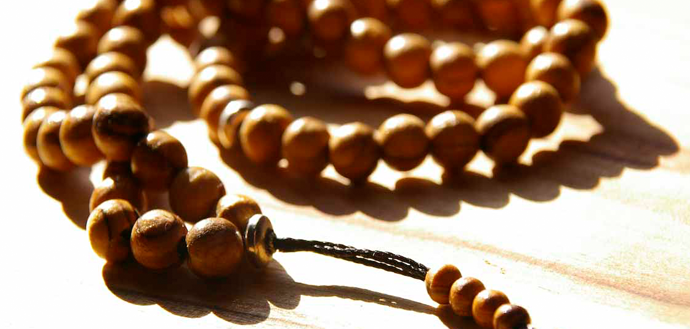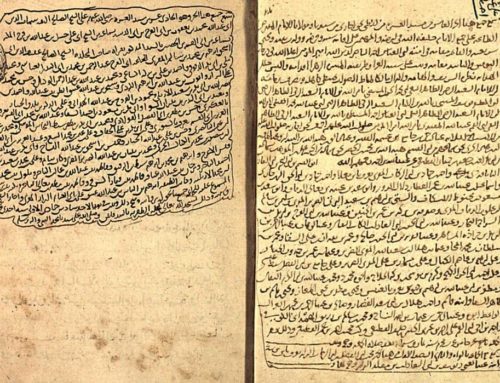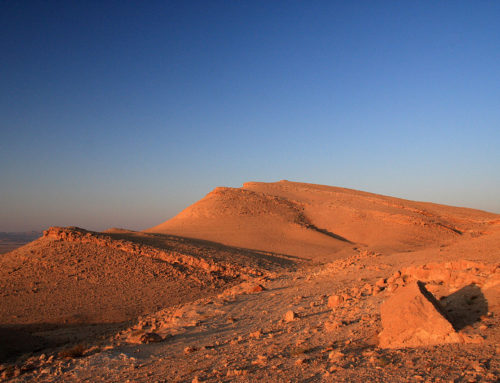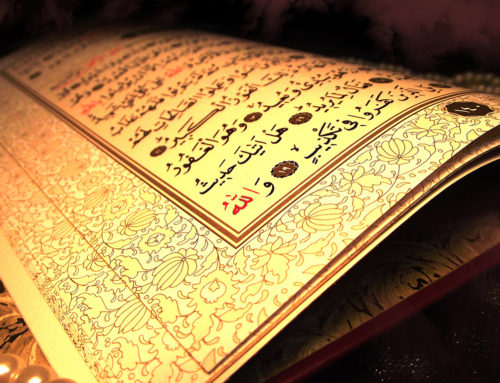Translated by Ismaeel Nakhuda
Question
To my sayyid, my mawla (may Allah increase your piety),
Al-Salam ‘alaykum wa rahmat Allah wa barakatuh,
Your dear letter arrived on 15 Dhu ‘l-Hijjah. I am regretful for not being able to present myself in the service of Maulwi ‘Abd al-Rahman. What are the detailed circumstances of the destitute that I may convey to you? The road to here, however, is very dangerous. Do not, at all, take the trouble [to visit]. This would be very difficult on this lowly one.
There is something I wanted to tell. However, I feel I should write it. What I want to say is that Mawlana Karim Baksh, the professor from Lahore, says that the al-ithbat al-mujarrad [1] The dhikr of the “mere affirmation”, which is the repeated dhikr of the name of Allah. as done in the Chishti tariqah — and that is the two-worded beat (darb) ‘Allahu Allah’ — has no basis in Shari’ah. Rather, it is against Shari’ah. Hence, [he says] ‘Allamah Suyuti has opposed this in Al-Itqan fi ‘Ulum al-Qur’an and Radi has also written against it in terms of Arabic Nahw. He also says that he was in the service of Hakim al-Ummah Mawlana Ashraf ‘Ali Thanwi and that Maulwi As’ad Allah was also there. According to him, Hakim al-Ummah said one should not do it. This lowly one was left deeply surprised by this and is seeking verification. Please clarify. Ask respected Maulwi As’ad Allah what his shaykh had said.
Wa ‘l-Salam
[Mawlana Shah] ‘Abd al-Qadir Raipuri
Answer
Maulwi Karim Bakhsh’s objection is not his own. He often reads the books of Hafiz Ibn al-Qayyim who is extreme. He has written an individual treatise on this in which he has, according to his habit, objected. Mawlana As’ad Allah cannot properly remember what was mentioned in Hakim al-Ummah’s gathering. However, what he does remember he will write himself.
Moreover, this issue has not just been discussed recently but has been so for a long time. Shah Wali Allah writes in Shifa ‘l-‘Alil [2]Shifa al-‘Alil is the Urdu translation of Shah Wali Allah’s Al-Qawl al-Jamil. Shifa al-‘Alil was published together with the Arabic text [matn] of Al-Qawl al-Jamil. that this [form of dhikr] did not exist among the Naqshbandis of previous times. The [Urdu] translator [of Shifa al-‘Alil] then writes that the al-ithbat al-mujarrad is not established in Shari’ah. In spite of this, Shah Wali Allah writes [further on in Arabic], “I heard my master, my father say that the nafi ithbat [3]The dhikr of “negation and affirmation”, which is the dhikr of La ilaha illa Allah. is very beneficial for Suluk and that the al-ithbat al-mujarrad is beneficial for jazb (raptness)…”
Khafaji has discussed this in detail in Nasim al-Riyad. Hakim al-Ummah has also mentioned this in Bawadir al-Nawadir (p.67) in which he has carried out a detailed discussion from which the mawlana’s [alleged] view of objection is not felt, rather he has allegorically interpreted (tawjihat) it from which it can be understood that Hakim al-Ummah not only accepted the practice but preferred it due to various reasons.
I do not know where it is mentioned that Radi said it is wrong. However, according to the rules of Nahw it seems it is not. Having a subject (mubtada) with a hidden predicate (mahdhuf al-khabar) is something widespread across the world. [4]An example of this would be for Bakr to call out to Zayd from a distance by only saying his name. On hearing, Zayd would turn and become attentive. The grammarians say the hidden predicate here could … Continue reading The Sufis themselves indicate towards this (the hidden predicate) when they say Allahu hadiri (Allah is with me), Allahu naziri (Allah is watching me) etc. This is mentioned in detail in Bawadir al-Nawadir (p.256). [5]At this point, due to the importance of the contents, the compiler of the letters, Mawlana Muhammad Shahid Saharanpuri, included the entire section of Bawadir al-Nawadir with some minor changes in … Continue reading After this, Hakim al-Ummah writes: “With the praise of Allah, all objections have been answered and it has been established that the ruling that it is an innovation (bid’ah) is due to a lack of thought to it.” Hakim al-Ummah’s anecdote — the complete status of which is unknown — as mentioned by Maulwi Karim Bakhsh is not noteworthy in opposition to these texts.
Ibn Hajar al-Shafi’i al-Makki writes in Al-Fatawa al-Hadithiyya, “… and the dhikr of La ilaha illa Allah is better than the dhikr of His Majesty [6]In other words the dhikr of the name of Allah. in general. This view is according to the imams of the exoteric sciences. However, according to the people of the esoteric sciences, circumstances vary according to the differing conditions of the salik…”
Imam Ghazali in Al-Tajrid fi Kalimat ‘l-Tawhid writes, “As long as you are stained with looking towards anything apart from Him, then there is a need to affirm the negative [by saying] La ilaha (there is no deity).” He writes at another place, “… and the salik has three states (hal) … and when you are in the realm of jadhbah (attraction) then constantly recite ‘Allah, Allah’…” In addition, Imam Ghazali is a hadith scholar and a jurist (faqih).
It has also been narrated abundantly in authentic hadiths that Allah has ninety-nine names and that “whoever memorises them will enter paradise”. In order to memorise them, repeating them and reciting them over and over again is necessary and established. It is on account of this that it is mentioned in Tafsir al-‘Azizi that whenever a seeker would come to Shaykh Abu Khubayb al-Suhrawardi then, after one or two chillahs (forty days), he would seat him in front of him and recite the ninety-nine names and maintain eye contact. If a name was to cause a change or effect on the person then he would prescribe that name and advise the person to adopt the path of the righteous.
It is also written in Jawahir al-Suluk (p.145), “The method of [the dhikr of] Allah (ism al-dhat) is to remember Allah while making beats (darb) [7]The darb of the ism al-dhat in the Chishti way involves the moving of the head diagonally from right to left (to the heart), reciting the name of Allah each time. and have the intention that nothing apart from Him is the purpose, aim or beloved…” In this form, it is a subject with a hidden predicate, which is in complete agreement with the rules of Nahw. In fact, according to this sinful one it is in total conformity with the words of the Qur’an. In the verse: “Say Allah, then leave them…” there is a subject with a hidden predicate.
Some shaykhs have also presented proof from the hadith: “The Day of Reckoning will not be established as long as ‘Allah, Allah’ is uttered on earth.” The objectors say the meaning of this hadith is general [8]General, as in this hadith is not particular to repeatedly reciting the name of Allah. (‘am). This is correct. However, this interpretation [of being allowed to do the dhikr of ‘Allah, Allah’] also comes under this general meaning. There is no proof of exclusion.
Anyway, the report that Hakim al-Ummah has considered it wrong has been reported wrongly. I have briefly looked over Al-Itqan fi ‘Ulum al-Qur’an and not found anything. There is a need for a reference. This (the dhikr of the name of Allah) is not particular to any one individual Silsilah. In fact it is prevalent in all Silsilahs in different ways. In opposition to all of them, in such a collective issue (ijma’i mas’ala) of theirs, the sayings of Ibn al-Qayyim or al-Suyuti — let alone Radi et al. — cannot be quoted to consider it wrong.
It is written in Jami’i al-Usul (p.13), “The primary form of dhikr according to the Naqshbandis is the word Allah, and according to the Shadhilis it is saying La ilaha illa Allah. They (these two forms of dhikr) are, in all of the tariqs, recited together with sending salutations (salat) and istighfar (seeking forgiveness). The meaning of the [individual] word Allah is that Allah is my ‘purpose’ or my ‘want’ or my ‘beloved’ … and what is more sound according to the Naqshbandis is that there is no phrase [9] In that the word Allah is not, according to the Naqshbandis, part of a sentence. Rather one utters the word and meditates His essence. but one shall say Allah and then meditate the purity of His essence without composing a sentence.”
It is clear from the above that there are two views according to the Naqshbandi shaykhs. [10]One view is that it is part of a sentence as in ‘Allah is my purpose’, ‘Allah is my want’ or ‘Allah is my beloved’. The other view is that the word is a single … Continue reading What is more favourable is that the word is a single unit (mufrad). There is, however, no objection [to this] as they (the Naqshbandis) do not utter the word but only meditate it while the rest [of the shaykhs] consider the word part of a phrase (murakkab) with several possible [syntactical] constructions as mentioned above. This is in spite of the grammarians (nahwis) considering it wrong to remove the interjection/exclamation (harf al-nida); this is most likely what Radi has written. In such a scenario, the word, at the most, should not be made a noun in the vocative case (munada). However, according to this lowly one this is a subject with a hidden predicate. According to Hakim al-Ummah’s reasoning, [the recitation of Allah, Allah] is the repetition of a portion of a sentence. There is no objection in this. [11]These letters were published in Maktubat-i-Tasawwuf (p.123-128), a collection of the Shaykh al-Hadith’s letters compiled in 1392AH by Mawlana Muhammad Shahid Saharanpuri. The copy I have in … Continue reading
[Shaykh al-Hadith] Mawlana Muhammad Zakariyya Kandhlawi
30 Dhu al-Hijjah
| ↑1 | The dhikr of the “mere affirmation”, which is the repeated dhikr of the name of Allah. |
|---|---|
| ↑2 | Shifa al-‘Alil is the Urdu translation of Shah Wali Allah’s Al-Qawl al-Jamil. Shifa al-‘Alil was published together with the Arabic text [matn] of Al-Qawl al-Jamil. |
| ↑3 | The dhikr of “negation and affirmation”, which is the dhikr of La ilaha illa Allah. |
| ↑4 | An example of this would be for Bakr to call out to Zayd from a distance by only saying his name. On hearing, Zayd would turn and become attentive. The grammarians say the hidden predicate here could be, for example, “Zayd look at me”, “Zayd be attentive” or “Zayd listen to me”. |
| ↑5 | At this point, due to the importance of the contents, the compiler of the letters, Mawlana Muhammad Shahid Saharanpuri, included the entire section of Bawadir al-Nawadir with some minor changes in the footnotes: “…when reading the Qur’an, the purpose is at times its recital, and at times to firmly memorise it. For example one person repeats an individual word to commit to memory, another repeats an individual sentence and another repeats an entire verse — all of this is permissible. There is no need to research what the way of the predecessors was. “Likewise, the actual purpose of dhikr at times is the actual dhikr, and at times the envisioning and firmly establishing of a particular goal which is connected to that [form of] worship. Hence, the actual purpose of the repetition of a fixed amount of illa Allah and the name of His Majesty is not dhikr. Rather, the envisioning of a particular purpose; that purpose is the slow advancement in annihilation (fana) from the knowledge of anything apart from Allah and paying complete attention to Him. “Hence, at the beginning, one contemplates a lot of things. As a result, through La ilaha illa Allah that which is contemplated is negated and [its meaning] is firmly rooted. Then, when one is successful to a certain level in that negation, to firmly establish His essence in one’s mind, one repeats illa Allah. Then even this [last] establishing is a nisbah hukmiyyah. Moving on, to just firmly establish the envisioning of His essence in one’s mind one repeats the name of His Majesty. The rigorous pursuit of this would allow [one to develop] in the heart a firm ability to not pay attention to that which is not the goal and pay complete attention to that which is the goal, leading to continually achieving the targeted proximity while completing the rights of a perfect form of dhikr. “With the praise of Allah Most High, all objections have been answered and it has been established that the ruling that it is an innovation (bid’ah) is due to a lack of thought to it.” |
| ↑6 | In other words the dhikr of the name of Allah. |
| ↑7 | The darb of the ism al-dhat in the Chishti way involves the moving of the head diagonally from right to left (to the heart), reciting the name of Allah each time. |
| ↑8 | General, as in this hadith is not particular to repeatedly reciting the name of Allah. |
| ↑9 | In that the word Allah is not, according to the Naqshbandis, part of a sentence. Rather one utters the word and meditates His essence. |
| ↑10 | One view is that it is part of a sentence as in ‘Allah is my purpose’, ‘Allah is my want’ or ‘Allah is my beloved’. The other view is that the word is a single unit and meditated. |
| ↑11 | These letters were published in Maktubat-i-Tasawwuf (p.123-128), a collection of the Shaykh al-Hadith’s letters compiled in 1392AH by Mawlana Muhammad Shahid Saharanpuri. The copy I have in front of me was published by Maktabah al-Shaykh in Karachi (translator). |







Assalam o Alaikum warahmat Allah wabarakatuh!
My question is that ,is this right to do zikr of any name of Allah for attainig its benifits or status in people, like someone do vird of name of Allah (AL MUIZZU)for acquiring respect in his people is right or he one should do wird just for the pure worship of his Allah.please clear this point what should one do i mean what should be the AQEEDAH in his heart while doing wird o zikr?
thank you
Walikum Assalam sister !
Zikr is basically used to attain purification of one’s heart. It doesn’t have a mean to atain respect of one’s in the society. Though , if you get a respect in the society by doing zikr and people knowing about this that you are performing zikr and good deeds, Its a side benefit of the good deeds, But its not the thing that you only get respect within the society via Zikr.
Wassalam
Dear Brothers and Sisters,
Why so much confusion and explanation required. Any good deed in Islam is based on the prophets sunnah. If prophet Muhammad(PBUH) has told this dhikr u can also tell. I he (PBUH) has not then dont tell. We know so many dhikr which prophet (PBUH) has taught us. Then make that dhikr.
Bad ul hamd was-Salawat wa Irsal-ut-Taslimat wat-Tahiyyat
Assalaamu aleykum wa rahmatullah,
every good deed should be done only for the sake of Allah Ta’ala and with this we should have yaqin (firm believe), that HE will give us what he promised us for the deeds, whether it is in this world or in the hereafter.
Allah says in the Quran more or less: “And make dhikr with the name of your sustainer…” From this Ulama said, that it is not only allowed, but desirable to do also dhikr with the Names of Allah. And ALlah Ta’ala knows best.